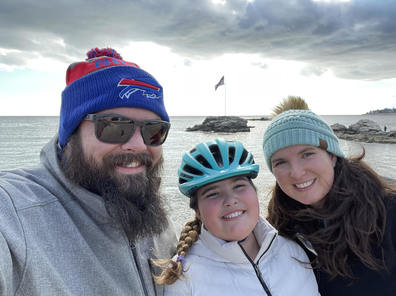Claire Healy
CAPSTONE
Capstone Project Committee: Nancy Callanan, MS, CGC, Kristen Doehler, PhD (Statistical Consultant), James Evans, MD, Catherine Fine, MS, CGC
Background: For the small subset of individuals who test positive for a BRCA1 or BRCA2 mutation the information can have far reaching implications for their health and health management, (deBock et al., 1999 & Euhus et al., 2002). Genetic counselors are often responsible for estimating a client’s risk of harboring a BRCA mutation to determine if they should undergo genetic testing. One tool available to genetic counselors to help them identify those individuals who would benefit from genetic testing is the computer algorithm BRCAPRO (Euhus, 2004). In many instances counselors do not use an algorithm like BRCAPRO and instead rely on their own personal experience when assessing a client’s risk. Purpose: The purpose of this study was to evaluate cancer genetic counselors’ risk estimations of a hypothetical client in order to determine how counselors’ estimates compare to the computer algorithm BRCAPRO.
Methods: Fifty-three cancer genetic counselors performed thirteen risk assessments on ten pedigrees, typical of those seen in a cancer genetics clinic, free of outside resources and then assigned a risk estimate to the indicated proband. These risk estimates were compared among counselors and with the risk value generated by BRCAPRO to determine if there was significant variability.
Results: The risk values generated by the fifty-three participants showed considerable interpersonal variability. When compared to BRCAPRO, counselors’ risk estimations were significantly different (p<0.05) in seven out of the thirteen risk assessments.
Conclusions: The results of the study indicate that there is significant interpersonal variability among counselors’ risk estimation. In the majority of cases counselors’ risk estimates varied significantly from the risk generated by BRCAPRO. However, in some instances the counselors’ risk estimations may be a more appropriate reflection of the proband’s true risk given the inherent limitations of BRCAPRO.
Since Graduation

After leaving UNCG Claire started her career at the Dana Farber Cancer Institute in Boston where she worked for seven years. For the last five years she has worked at the Smilow Cancer Genetics and Prevention Clinic at Yale-New Haven Hospital in New Haven, CT where she is currently a manager. Claire and her husband, who became engaged while she was a student at UNCG, have been married for 11 years and have a 9 year old daughter. They bought their first house in late 2019 and have been using all the time at home over the past year for numerous home improvement projects.